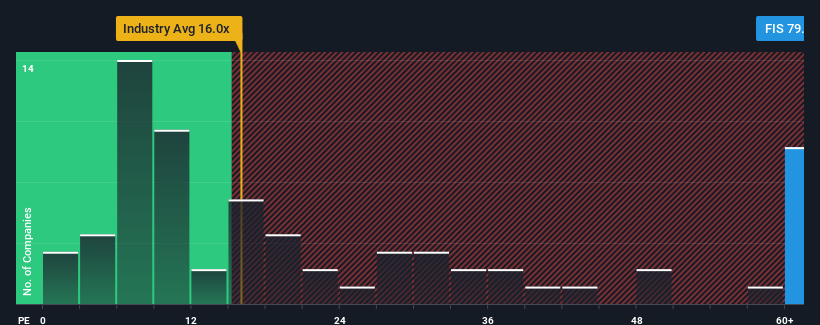- United States
- /
- Diversified Financial
- /
- NYSE:FIS
Fidelity National Information Services, Inc.'s (NYSE:FIS) Earnings Haven't Escaped The Attention Of Investors

Fidelity National Information Services, Inc.'s (NYSE:FIS) price-to-earnings (or "P/E") ratio of 79.1x might make it look like a strong sell right now compared to the market in the United States, where around half of the companies have P/E ratios below 18x and even P/E's below 10x are quite common. Nonetheless, we'd need to dig a little deeper to determine if there is a rational basis for the highly elevated P/E.
With its earnings growth in positive territory compared to the declining earnings of most other companies, Fidelity National Information Services has been doing quite well of late. The P/E is probably high because investors think the company will continue to navigate the broader market headwinds better than most. If not, then existing shareholders might be a little nervous about the viability of the share price.
Check out our latest analysis for Fidelity National Information Services

Does Growth Match The High P/E?
The only time you'd be truly comfortable seeing a P/E as steep as Fidelity National Information Services' is when the company's growth is on track to outshine the market decidedly.
If we review the last year of earnings growth, the company posted a terrific increase of 19%. The latest three year period has also seen an excellent 630% overall rise in EPS, aided by its short-term performance. So we can start by confirming that the company has done a great job of growing earnings over that time.
Turning to the outlook, the next three years should generate growth of 65% per year as estimated by the analysts watching the company. That's shaping up to be materially higher than the 10% each year growth forecast for the broader market.
In light of this, it's understandable that Fidelity National Information Services' P/E sits above the majority of other companies. Apparently shareholders aren't keen to offload something that is potentially eyeing a more prosperous future.
The Bottom Line On Fidelity National Information Services' P/E
Generally, our preference is to limit the use of the price-to-earnings ratio to establishing what the market thinks about the overall health of a company.
As we suspected, our examination of Fidelity National Information Services' analyst forecasts revealed that its superior earnings outlook is contributing to its high P/E. At this stage investors feel the potential for a deterioration in earnings isn't great enough to justify a lower P/E ratio. It's hard to see the share price falling strongly in the near future under these circumstances.
You always need to take note of risks, for example - Fidelity National Information Services has 3 warning signs we think you should be aware of.
Of course, you might also be able to find a better stock than Fidelity National Information Services. So you may wish to see this free collection of other companies that have reasonable P/E ratios and have grown earnings strongly.
New: AI Stock Screener & Alerts
Our new AI Stock Screener scans the market every day to uncover opportunities.
• Dividend Powerhouses (3%+ Yield)
• Undervalued Small Caps with Insider Buying
• High growth Tech and AI Companies
Or build your own from over 50 metrics.
Have feedback on this article? Concerned about the content? Get in touch with us directly. Alternatively, email editorial-team (at) simplywallst.com.
This article by Simply Wall St is general in nature. We provide commentary based on historical data and analyst forecasts only using an unbiased methodology and our articles are not intended to be financial advice. It does not constitute a recommendation to buy or sell any stock, and does not take account of your objectives, or your financial situation. We aim to bring you long-term focused analysis driven by fundamental data. Note that our analysis may not factor in the latest price-sensitive company announcements or qualitative material. Simply Wall St has no position in any stocks mentioned.
About NYSE:FIS
Fidelity National Information Services
Fidelity National Information Services, Inc.
Reasonable growth potential with proven track record.
Similar Companies
Market Insights
Community Narratives




